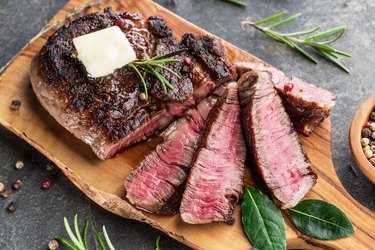
You planned to grill steaks on your outdoor BBQ, but now it's raining. You might think you can't grill those thick, juicy ribeyes indoors, but with some adjustments to cooking time, the meat can still come out delicious and juicy.
Plus, if you use a George Foreman Grill, it's designed to drain up to 42 percent of the fat from the meat, which will make your steak a bit more healthy.
Video of the Day
Video of the Day
Things You'll Need
4 ribeye steaks, 8 to 12 oz. each
2 cups marinade of your choice
1/4 cup dry seasoning, optional
2 tbsp. olive oil
Bowl
Plastic wrap
Basting brush
Spatula
Step 1: Marinade the Steaks
- Place the ribeyes in a large bowl and pour the marinade over them.
- Turn the steaks to coat them.
- Cover the bowl with plastic wrap and leave the meat in the refrigerator overnight.
Tip
You should marinate steaks before you cook them on a contact grill, because the pressure from the top grill plate can dry the ribeyes out.
Step 2: Let Set at Room Temperature
Take the steaks out of the marinade and allow them to warm up to room temperature, or about 70 degrees, before you grill them.
The contact plates on the grill will melt the fat quickly, causing it to run out into the drip tray before it can help the steak self-baste. But if the steak is warmer when it goes on the grill, it'll begin cooking faster and will benefit more from the melting fat.
Step 3: Preheat the Grill
- Turn the grill on. If your grill has settings, turn it on high.
- Allow the grill to preheat for 5 minutes.
- Oil the grill plates with olive oil and your basting brush as the grill warms up to help prevent the ribeyes from drying out.
Step 4: Grill the Steaks
- Place the steaks on the grill but don't lower the lid.
- Grill the steaks 10 minutes, flipping halfway through and basting the steaks occasionally with the reserved marinade.
Tip
If you like a drier, crispy crust on your steak, press down on the top portion occasionally to maximize the ribbye's contact with the grill plates. However, if you would like a juicer steak, avoid closing the top of the grill because it will squeeze out the juices.
Step 5: Check for Doneness
Use your meat thermometer to take the temperature of the steak. According to Certified Angus Beef, the steak should be:
- 125 degrees Fahrenheit for rare
- 135 degrees Fahrenheit for medium-rare
- 145 degrees Fahrenheit for medium
- 150 degrees Fahrenheit for medium-well
- 160 degrees Fahrenheit for well-done
Step 6: Let Rest
Allow the steaks to rest for 15 minutes before you serve them. This will prevent the juices from running out as you cut them.